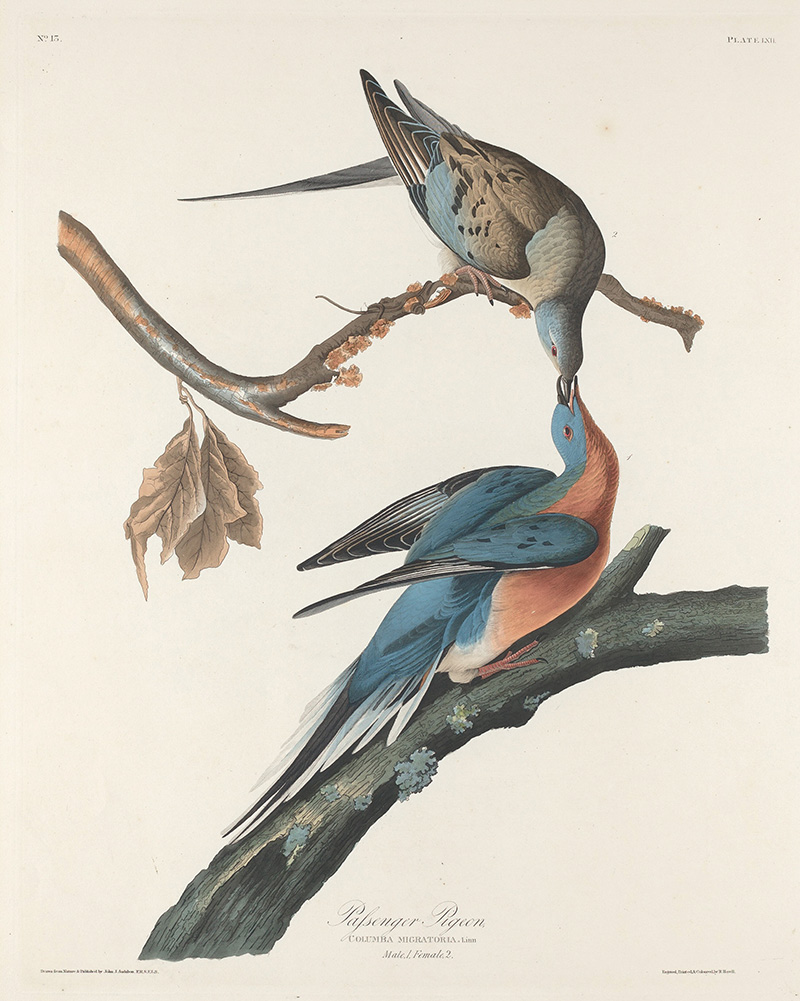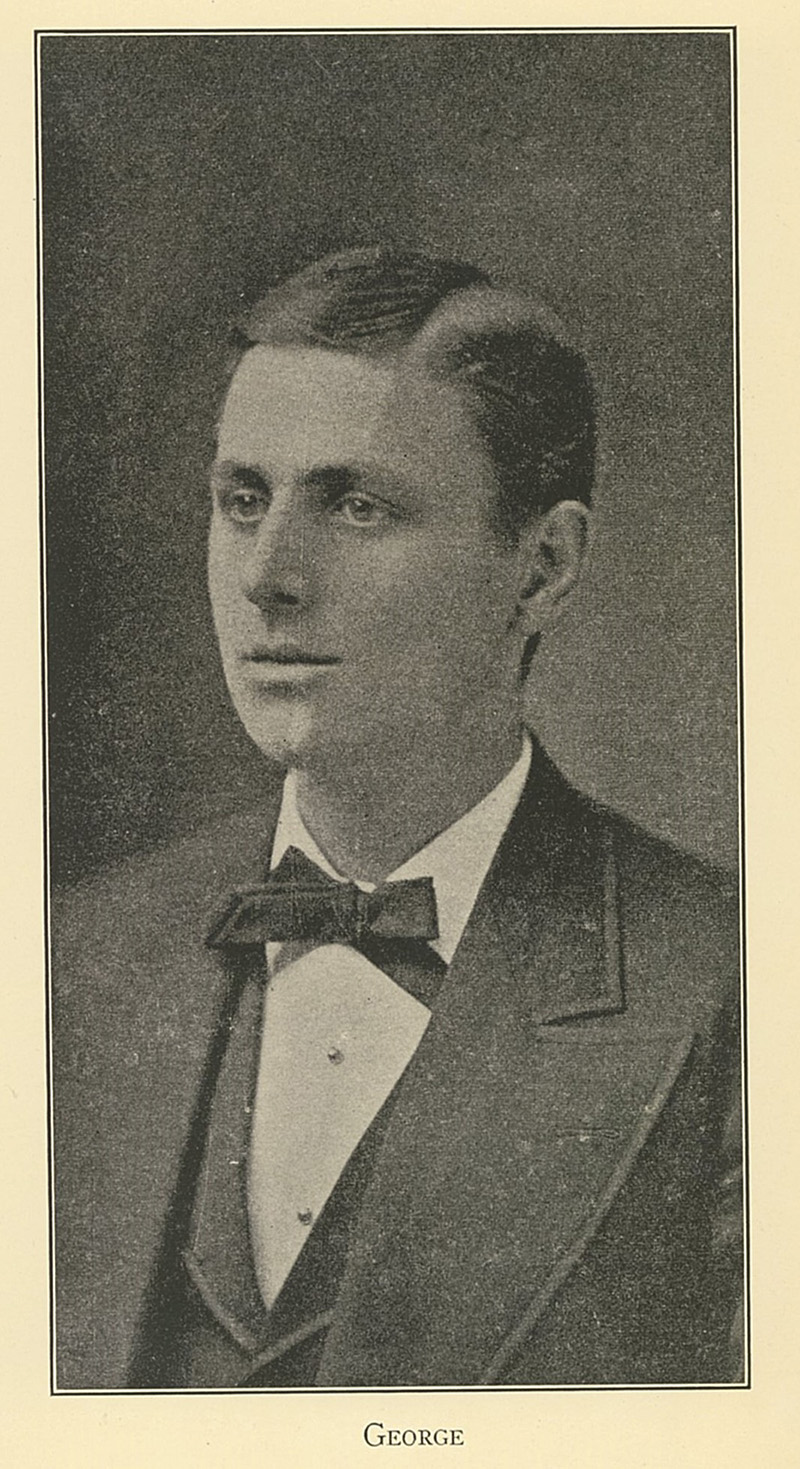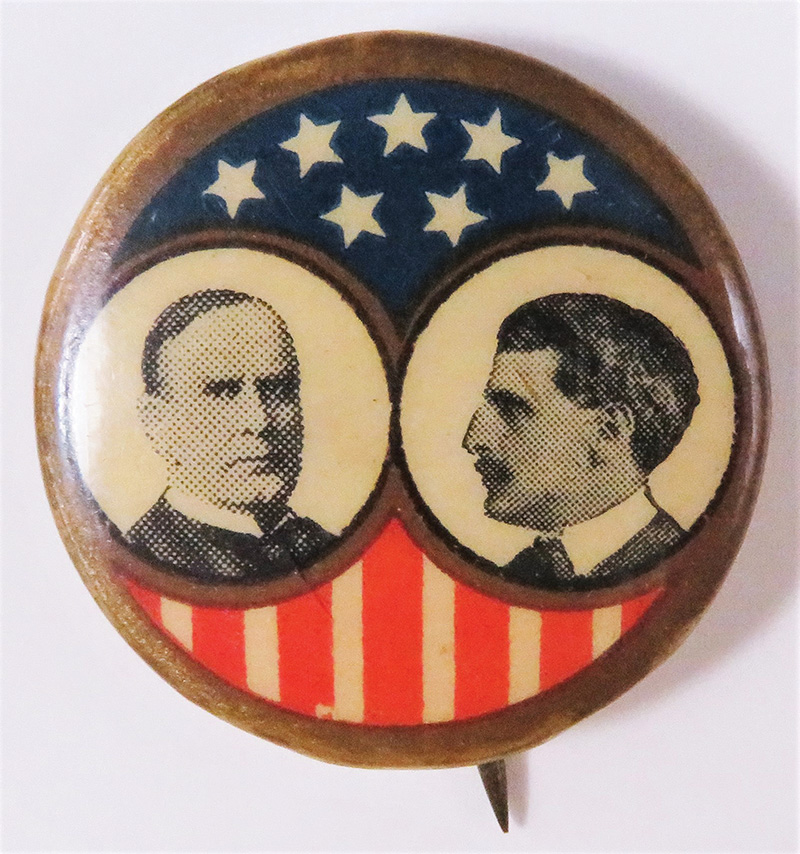

Passenger Pigeon, 1829, by John James Audubon. Image Credit: National Gallery of Art, public domain.
The Death of Martha
On September 1, 1914, at 1:00 p.m., the last passenger pigeon on Earth, Martha (named after Martha Washington), died at the Cincinnati Zoo. Once North America’s most abundant bird, numbering three to five billion, this sleek bird built for speed was hunted into extinction and was the poster child of the “Age of Extermination,” when birds were mercilessly killed for food, fashion, and sport. Other common birds that faced extinction in the early 1900s include the wood duck, the snowy egret, the whooping crane, trumpeter swan, and the doomed Carolina parakeet, America’s only endemic parrot. Reflecting upon the extinction of the passenger pigeon, naturalist Aldo Leopold wrote in 1947, “This species became extinct through the avarice and thoughtlessness of man.”
Early settlers of North America viewed birds and other natural resources as limitless. However, by around 1900, this illusion of abundance was replaced by the realities of scarcity and extinction. What had gone wrong? Following the Civil War, America experienced a remarkable surge in population, from 31 million people in 1860 to 72 million by 1900. There were simply more mouths to feed, and opportunistic bird hunters eagerly met the need. Adding to this rising demand was the insatiable desire for bird plumage to adorn women’s hats. But it was advances in gun technology that supercharged bird mortality rates, such as the advent of the automatic shotgun around 1890. The slaughter of birds went from hundreds of thousands each year, to millions, then tens of millions, and higher. There was no easy solution to stop or slow the killing. States and localities were free to devise their own hunting regulations and enforce them however they wished.

George P. McLean, age twenty. Image Credit: From the collection of Will McLean Greeley.
Enter George P. McLean: Prepared to Aid Birds
This perilous situation for birds is the backdrop for Will McLean Greeley’s new biography of Connecticut Senator George P. McLean, titled A Connecticut Yankee Goes to Washington: Senator George P. McLean, Birdman of the Senate, published by RIT Press. This is the story of how Connecticut’s George Payne McLean helped establish lasting legal protections for birds by overseeing passage of the Migratory Bird Treaty Act (MBTA) of 1918—landmark environmental protection legislation that is still in effect today. Greeley, McLean’s great-great nephew, puts McLean’s victory for birds in the context of his distinguished forty-five-year career, marked by many acts of reform during a time of widespread corruption and political instability. David Allen Sibley, author and illustrator of The Sibley Guide to Birds, writes of the book: “On one level this is a fascinating, and thoroughly researched, glimpse into the workings of US politics in the early twentieth century. On another level it’s an inspiring story of one man’s determination and steadfast commitment to securing legal protections for birds. I am glad to know more about George McLean.”
For many people today, the Migratory Bird Treaty Act is a just footnote in conservation history, or a complex set of laws and regulations. Greeley puts a personal face on the MBTA, relating it to McLean’s rich and varied life experiences and exploring the intersection of culture and politics. A key theme in Greeley’s book is the indispensable role McLean played in passing the MBTA. A man of vision, courage, political skill, and perseverance, McLean was uniquely positioned and prepared to lead passage of this landmark bill. Passage of the MBTA was not cheaply won—a reminder that it is never easy to lead societal change. McLean’s experience leading change and reform as a young state legislator and the governor of Connecticut prepared and equipped him to wage the hard-fought struggle to pass the MBTA. In these roles, McLean learned through adversity how to lead change, including skills such as building coalitions, adapting to the objections of opponents, and getting support from the public by communicating the benefits of change.
McLean’s Rise from Obscurity
McLean’s rise from obscurity as a Connecticut farm boy to national prominence is the American dream writ large. McLean grew up on a subsistence farm in rural Connecticut but came to know seven US presidents. When he arrived at Hartford Public High School in 1872, he was bullied because of the clothes he wore, which were fashioned from flax and wool by his mother. But, over time, McLean won the respect of many of his antagonists, who came to view him as the brainiest member of their class. His peers eventually named him the class orator and the school editor in recognition of his exceptional writing and speaking skills.
McLean had two dreams when he graduated from high school: first, become publisher of the largest newspaper in Connecticut; second, get elected president of the United States. His first job was as a reporter for the Hartford Post. It was there that he met many influential politicians, covering them for the newspaper. They viewed McLean as a very able, ambitious, personable young man with a promising future in politics. So, they mentored him, encouraging McLean to study law and then run for the Connecticut legislature, and at age twenty-five he was elected to his first political office.
McLean’s Track Record Leading Political Reform
George P. McLean had a track record for leading political reform at many junctures of his forty-five-year career. While in the legislature in his twenties, McLean identified the very corrupt practice of how pardons were granted to the imprisoned: pardons were decided by the Connecticut state legislature, usually in a circus-like atmosphere, and sometimes swayed by bribery and favor trading. McLean’s reform efforts resulted in the creation of the Connecticut Board of Pardons, a significant achievement that made him a political up-and-comer by age thirty. After he left the legislature, McLean practiced law but stayed active in politics, and in 1896 he was named US Attorney for Connecticut by then-president Benjamin Harrison. In 1900, at age forty-three, McLean reached the summit of his early career when he was elected governor of Connecticut. The future looked bright for the former farm boy from Simsbury. Now governor of his home state, McLean’s dream of the US presidency seemed within reach.
A Surprisingly Reform-Minded Governor
In his inaugural address, Governor McLean outlined an ambitious reform plan, including a tax on “moneyed corporations,” free textbooks for public school students, and several tax reform proposals. McLean’s signature reform issue was the reapportionment of the Connecticut Assembly, ending the so-called rotten boroughs system that heavily favored rural small towns over Connecticut’s fast-growing cities. Dating back to colonial times, Connecticut’s “town system” granted up to two representatives per city and town, regardless of population. As a result, the Connecticut legislature was controlled by the more numerous small towns, in effect disenfranchising Connecticut’s urban areas. Control of the state legislature was especially important as state legislatures elected US senators until 1913. (The seventeenth amendment provided for the direct popular election of US senators, ratified by the states in 1913.)
Defeat, Exile, and an Unlikely Comeback
McLean’s reform initiatives as governor were spectacularly unsuccessful. He faced bitter opposition, ironically from many of the same people who had previously supported him. Several of McLean’s earliest mentors became his harshest critics. The leaders of McLean’s own political party, the Republicans, also bitterly fought his reforms. McLean’s last year as the governor was very contentious and filled with adversity. He vainly searched for compromise solutions to get some semblance of his reform agenda passed, but in the end his reforms were defeated. He was also physically, mentally, and emotionally exhausted. He felt like he’d failed and lost his opportunity to shine on the national stage, his presidential ambitions slipping away. All of this sent McLean into a paralyzing depression and, eventually, a serious breakdown of his mental health.

McLean Campaign Button for Governor, 1900, with President McKinley. Images Credit: From the Collection of Dr. Kenneth Florey.
From 1902 to 1910, McLean was exiled into the political wilderness, viewed as washed up by his political adversaries. Ever the reformer, McLean led nascent efforts to reform Connecticut’s mental health system. In 1908 he was named president of the nation’s first mental health professional organization, which was the forerunner of today’s Mental Health America, a professional association that advocates for improved care for the mentally ill. During these wilderness years, McLean, a bachelor, married Juliette Goodrich, a longtime companion from his hometown of Simsbury. The two loved to travel, usually spending the winter months in Georgia and Florida. McLean also resumed his law practice, took up golf, expanded his dairy herd, and grew shade tobacco on his boyhood farm. He tried a political comeback in 1905, running for the US Senate, but while McLean was initially the promising front-runner, his political enemies joined forces to derail his candidacy. McLean’s trademark persistence eventually paid off: in 1911, after a two-year campaigning effort, McLean finally won a seat in the US Senate, his first of three terms; he served in the world’s greatest deliberative body until 1929.
What If George P. McLean Had Never Been Born?
Bird protection legislation of some sort would have been passed if George P. McLean had never been born, but when and to what extent? McLean’s maiden speech in the Senate after he was elected in 1911 was about migratory bird protection, showing urgency and vision. He exhibited extraordinary perseverance over the next seven years, fighting delay tactics and engaging in spirited debates with opponents on the Senate floor. After America’s entry into the First World War in 1917, foes of bird protection argued with patriotic fervor that legislation about birds should be tabled indefinitely. But McLean had cultivated an important and unlikely ally: President Woodrow Wilson, a Democrat, from the opposite political party. Wilson eventually signed the MBTA into law on July 3, 1918, even though the US was fully participating in World War I, suffering through a global flu pandemic, and experiencing bitter labor strikes and widespread social unrest.
McLean’s perseverance and commitment to bird protection legislation came at a critical time. After the brutality of World War I, many Americans craved “normalcy,” settling into a new era of isolationism, sustained prosperity, and limited federal government action. The era of reform and change that helped spur bird protection legislation was largely over.
Ultimately, the world is a better place because George P. McLean didn’t quit after his failures as a reform-minded governor of Connecticut but instead returned to serve in the US Senate, where, along with others, he helped stop the killing of one of God’s most beautiful creations and established lasting legal protections for birds that we still benefit from and enjoy today.

